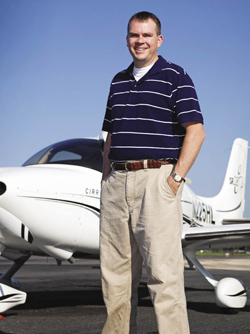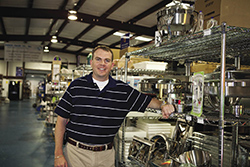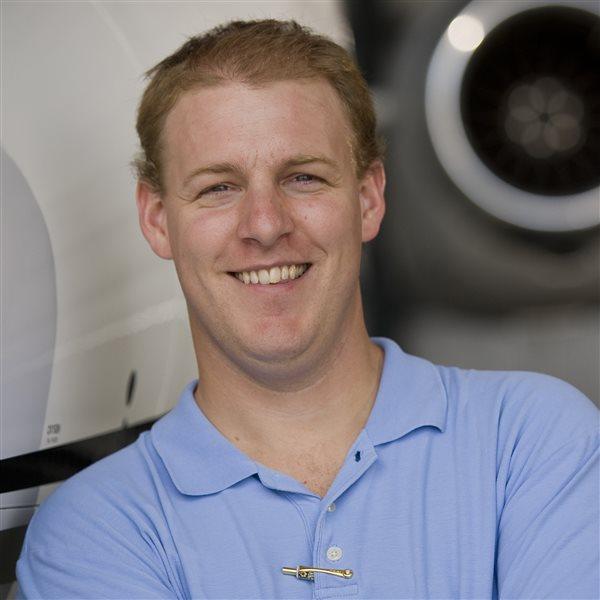GA Serves America: Flying the friendly skies
Personal aircraft make his job easier
 Brad Pierce and his family own a restaurant supply and consulting company in Orlando, which serves customers throughout the Southeast. Pierce is able to spend more time with his business and his family because of his Cirrus SR22, which he laughingly calls one of his best employees.
Brad Pierce and his family own a restaurant supply and consulting company in Orlando, which serves customers throughout the Southeast. Pierce is able to spend more time with his business and his family because of his Cirrus SR22, which he laughingly calls one of his best employees.
“There’s a delicious irony in seeing private luxury jets flying into Washington, D.C., and people coming off of them with tin cups in their hands.” It was November 18, 2008, a day that will live in infamy for aviation. Rep. Gary L. Ackerman (D-N.Y.) said those words as part of his opening remarks during a congressional hearing to question the CEOs of Ford, GM, and Chrysler about financial assistance. Their response? Crickets. Nothing. Not even a, “Wait…but…they’re efficient.” Ackerman’s remarks were the first of multiple comments regarding the automotive leaders’ use of corporate aviation to get to the hearing. The negative media firestorm that followed reaped untold damage on general aviation.
Things could have been so much different. Congress could have been questioning Brad Pierce—a Cirrus owner, and in many ways the typical owner/pilot who understands the value of GA to his business. “The Cirrus is one of the best employees I have,” he would have told them. “I’ve gained numerous clients as a result of my airplane.” Unfortunately they didn’t ask Pierce to testify, and the industry was hammered as a result. But that doesn’t stop him from proudly proclaiming the value of his airplane to anyone who will listen.
Family affair
 Pierce and his family own a restaurant supply and consulting business in Orlando. What started as a small office with five employees has grown to a warehouse, a robust online business, and 55 employees. Between online sales, consulting on new restaurant construction, and supplying national restaurant chains, Pierce is a man on the go. And he says if it weren’t for his airplane, he would spend a lot more time on the road away from his business and his family.
Pierce and his family own a restaurant supply and consulting business in Orlando. What started as a small office with five employees has grown to a warehouse, a robust online business, and 55 employees. Between online sales, consulting on new restaurant construction, and supplying national restaurant chains, Pierce is a man on the go. And he says if it weren’t for his airplane, he would spend a lot more time on the road away from his business and his family.
One recent trip is a perfect example of GA’s utility. Pierce, who’s been flying for 13 years, was scheduled to attend a weeklong meeting in Charleston, South Carolina. He had lunch with his family, took his time getting to the local airport, and then flew up in his Cirrus in time to make the first night’s dinner. There, Pierce talked to a number of colleagues who had arisen at 4 a.m. to make it to the dinner on time, and he was happy to share his stress-free travel experience. As if to further drive home the point to the other attendees, Pierce flew home midweek to surprise his twin sons on their birthday—and he made it back to the meeting that night in time for cocktails after dinner. “People kept asking why I didn’t go [to the boys’ birthday],” he said. “They couldn’t believe it when I told them I was already back.”
But Pierce doesn’t just impress his colleagues with his travel habits—his clients have voiced their approval as well. Pierce’s company was competing with a local supplier in North Carolina for a job. The potential client asked when Pierce could meet. “I’ll be there in a little more than two hours,” he said. Because of his airplane, Pierce was able to see the prospect even before the local competitor, one of the key reasons his company won the contract.
Since many of his trips involve unscheduled meetings, maintenance, and other hang-ups, scheduling could be a problem. GA makes it possible to stay until the job is done. “You don’t know when you’re going to get in or out of meetings in this business,” he says. “But we can stay and make sure the job is done, and not have to leave early to catch a flight.”
 But most of all, the airplane allows him to actually show up. A typical trip for Pierce might be to South Florida to visit a new grocery store his company is supplying. While some competitors may show up for the start-up, Pierce said he’s able to get in and out quickly and make many meetings he otherwise wouldn’t. He can go for a reason that might not justify a full day’s drive and possibly an overnight stay. “There’s a massive competitive advantage to it,” he says.
But most of all, the airplane allows him to actually show up. A typical trip for Pierce might be to South Florida to visit a new grocery store his company is supplying. While some competitors may show up for the start-up, Pierce said he’s able to get in and out quickly and make many meetings he otherwise wouldn’t. He can go for a reason that might not justify a full day’s drive and possibly an overnight stay. “There’s a massive competitive advantage to it,” he says.
Luckily for Pierce, the airplane doesn’t just allow him more time in the office and more flexibility when meeting with clients; it means more family time as well. “The Cirrus has truly changed my life,” he says. “It’s expanded the business, allowed me to get to see more customers, but most of all I don’t have to choose between personal and business.” In other words, it allows him to be a small business owner and still be an attentive dad to his sons.
Get-there-itis
There are certainly those who say using a single-engine GA airplane without deicing capability in a utility capacity is not possible. Don’t tell that to Pierce, who said he’s rarely had to cancel a flight. And to reduce the chances of pushing himself to get to a destination, he’s conceived a smart trick to cover his travel. Every time Pierce has a trip he can’t miss, he buys a ticket on Southwest Airlines. Then if he flies GA, which he does almost every time, Southwest credits him the price of the ticket. It’s a good way to make sure he never experiences get-there-itis.
Even if Pierce decided he had to fly GA, chances are he’d get there just fine. A self-proclaimed “risk-averse guy,” Pierce is conservative in his flight planning and weather tolerances. Despite that, he still manages to make the flight 95 percent of the time, he says. “Only one flight has been scrubbed for weather,” he says. And maintenance isn’t an issue either, since only two flights in more than two years had maintenance delays. “I’ve been delayed more on commercial.”
For his business, his family, and his personal satisfaction, it’s clear that the friendly skies are in GA for Brad Pierce. It’s hard to believe a 175-knot airplane can beat the schedule, reliability, and convenience of a system designed to move people efficiently at more than 430 knots. But it’s not only possible, it’s commonplace. Now just imagine if the Big Three auto executives had talked to Pierce before the hearings.
E-mail the author at [email protected].



